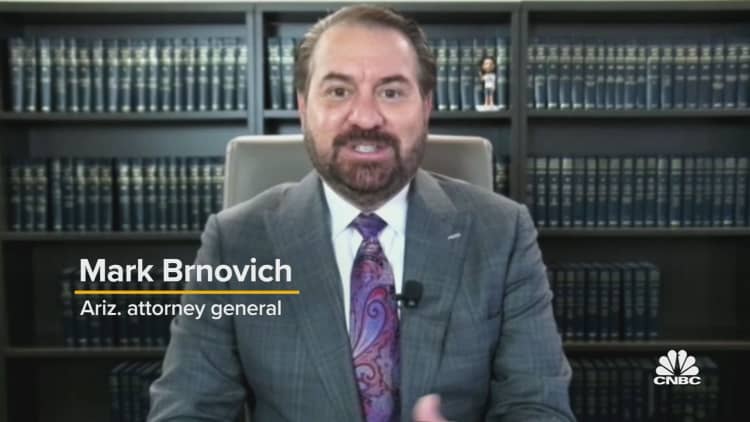Paul Moriki | Getty Images Entertainment | Getty Images
Two legal challenges filed against President Joe Biden’s student loan forgiveness plan have gone to the U.S. Supreme Court.
In August, Biden announced that tens of millions of Americans are eligible for education debt cancellation. Up to $20,000 if you receive a Pell-her grant in college, a type of aid available to low-income families, up to $10,000 if available to low-income families. did not do it. Individuals earning more than $125,000 or families earning more than $250,000 were excluded from relief.
Since then, Republicans and conservative groups have filed at least six lawsuits seeking to nullify the policy, arguing that the president does not have the power to cancel consumer debt without Congress and that the policy is harmful. rice field.
Details from Personal Finance:
Secure 2.0 Bill on Track to Lead Retirement Improvements
New retirement law ‘leaves big problems untouched’
New emergency savings rule could help tighten financial security
The Biden administration is acting within the law, noting that the Heroes Act of 2003 gives the U.S. Secretary of Education the power to waive student loan regulations during a national emergency. claim to be. The country has been operating under a state of emergency due to Covid since March 2020.
The battle has gone through the courts, and now nine U.S. Supreme Court judges are scheduled for high-profile legal discussions on the plan at the end of February.
Here’s what you need to know about the two cases that will be heard.
For 6 Republican-led states
On Sept. 29, six Republican-led states filed lawsuits against the president’s student-loan forgiveness plan, claiming that Biden has greatly exceeded his authority.Nebraska, Missouri, Arkansas, and Iowa. , Kansas, and South Carolina allege that debt relief “is not tailored to address the impact of the pandemic on federal student loan borrowers as required by the HEROES Act.”
But the Biden administration has argued that the public health crisis is taking a toll on student loan borrowers and that debt cancellation is necessary to stem a historic rise in delinquencies and defaults. likely to emphasize this concern to the judge.
Republican states also argue that loan forgiveness would disrupt their entities that benefited from the defunct Federal Family Education Loan (FFEL) program, under which program was abolished in 2010. , the government guaranteed loans by private banks and non-profit lenders. Although the U.S. Department of Education has moved to a system of direct loans to students, millions of borrowers continue to take out commercially held FFEL loans.
The state said the major loan servicer, headquartered in the Missouri Higher Education Loan Authority (MOHELA), had initially told borrowers that the Biden administration could move loans from the FFEL program to major federal governments. He points out that it will lose revenue. Loan program to qualify for that forgiveness.
But the administration moved quickly to preempt this debate, issuing guidance in September that commercial FFEL borrowers could no longer consolidate debt to qualify for the plan.
Mark Kantrowitz, an expert on higher education, said these developments undermine the state’s case.
“The potential loss of national revenue is not an ongoing concern,” he said.
Legal Objections Filed by Two Borrowers
The second case, which the Supreme Court will consider in February, was upheld by a conservative advocacy group, the Job Creators Network Foundation.
The lawsuit, filed Oct. 10, said two plaintiffs were harmed by “this arbitrary management overreach,” according to a foundation press release.
One of the plaintiffs, Myra Brown, says she is left out of the president’s relief because she holds the loans commercially. Another plaintiff, Alexander Taylor, claims he was not entitled to the maximum $20,000 waiver because he did not receive the Pell Grant while in college.
The lawsuit states that the president’s policy violated the Administrative Procedure Act’s notice and comment procedures and did not allow plaintiffs to argue in the form of pardon.
The Biden administration is likely to argue that the 2003 Heroes Act gives the secretary of education the power to change the federal student loan program in the event of a national emergency, Kantrowitz said. , Kantrowitz said.
The Heroes Act “explicitly waives the APA requirement for notice and comment periods,” he said.
“All the government needed to do was publish the exemption in the Federal Register and they did it,” he said.
The Biden administration has already denied that its policy will harm plaintiffs in the lawsuit, and to the contrary, the plan “will cost defendant Brown nothing and relieve defendant Taylor’s debt by $10,000.” I will.”

